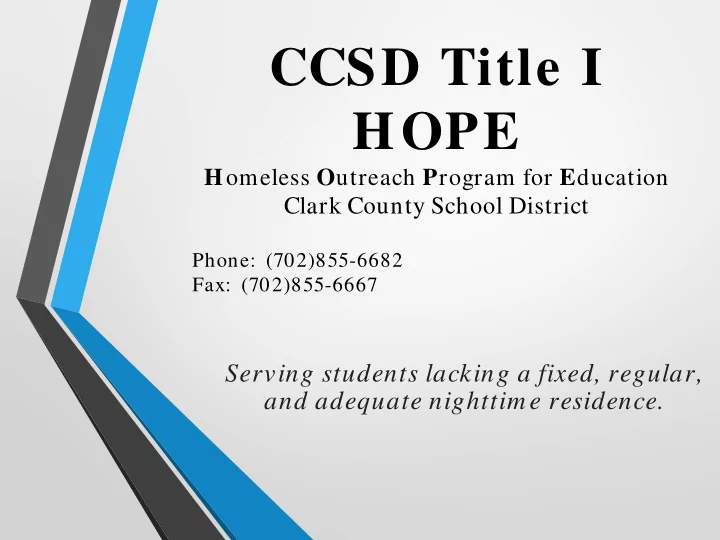

CCSD Title I HOPE H omeless O utreach P rogram for E ducation Clark County School District Phone: (702)855-6682 Fax: (702)855-6667 Serving students lacking a fixed, regular, and adequate nighttim e residence.
Mission Statement The Title I Homeless Outreach Program for Education of the Clark County School District works to remove barriers for homeless students to enroll in school and educate school personnel, parents and unaccompanied youth of the educational options under McKinney-Vento federal law.
The McKinney-Vento Hom eless Assistance Act Defines children and youth who lack a fixed, regular, and adequate nighttime residence as homeless. Includes the following: Living with Living in a Living in a Living in a friends shelter motel, car, park, because of hotel, or campsite economic RV park or on the hardship street Goal #1: The Law
Unaccompanied Homeless Youth How does the McKinney-Vento Act define UHY? • Youth that are experiencing homelessness while not in the physical custody of a parent of guardian • Lacking a fixed, regular, and adequate nighttime residence Where do UHY live? • In a variety of temporary, often unsafe, situations • Often couch-surfing (staying in the homes of other people) • May also be found living in cars, parks, shelters, and motels What is the school’s responsibility? • To enroll and educate UHY in accordance with the McKinney-Vento Act • To determine program eligibility based solely on the current nighttime living arrangement, not the circumstances that caused him/ her to leave home Goal #1: The Law
The McKinney-Vento Act provides homeless students the right: • To be enrolled immediately in school Immediate Enrollment • To attend their School of Origin School of Origin Transportation • To receive transportation to their School of Origin • To receive free breakfast and lunch Nutrition Achievement • To the same services/ programs as their housed peers Academic Goal #1: The Law
School of Origin How long may a What is School of How is placement student attend a Origin? determined? school of origin? • School of origin is • A homeless • Students wishing defined as the student may to attend School of school the child or attend a school of Origin must youth attended origin for the submit a request to when permanently entire duration of the HOPE office. housed or the the homelessness • The placement of school in which the or until the end of students child or youth was any school year in experiencing last enrolled. which the student homelessness will becomes be based on the permanently student’s best housed interest. Goal #1: The Law
Hom elessness and Education Research and data indicate that experiencing homelessness can have significant negative impacts on children academically, socially, and emotionally. Homeless students: • experience greater school mobility, which can cause interruptions to a child’s education and is associated with lower school achievement and increased risk of dropping out of school. • are at a greater risk of being chronically absent • face significant gaps in graduation rates US Department of Education, 2016
CCSD 20 17-20 18 5 th largest school district 358 Schools (not including 5 district sponsored charter schools) 321, 648 students enrolled 42,342 employees* *Includes full-time, part-time, temporary and substitutes
Title I HOPE Staff Administrators Licensed Staff Support Staff • Project • School Based • Secretaries Facilitators • Community • Student Success Based Advocates • Inventory Control
Identifying Students • Families/ students self identify during on line registration • School staff can assist in identifying students • Procedures in place to identify students during the school year
Supporting Student Success Community Partners Title I HOPE • Basic needs CCSD Homeless Families Departments Students • Access to information • Stability School Team • Opportunity
Title I HOPE Services: • Emergency Clothing • Backpacks or School Supplies and Toiletries • Out of State or Informational Birth Certificates • Cap & Gown • Academic Dues/ Fees Goal #3: Services
Title I HOPE Projects: • Donations/ Drives • Early Childhood Referrals • Operation School Bell • Shelter Collaboration • Summer School Support • Unaccompanied Homeless Youth • Mini-Conference • Professional Development Goal #2: Projects
CCSD HOPE Data May, 2018
Chapin Hall Statistics
Questions?
Recommend
More recommend